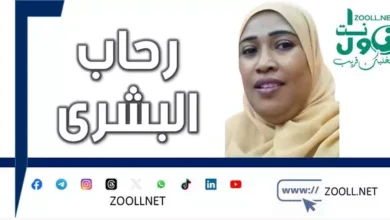The wisdom and insight of the first favorite team and the patriotism of the jealous colleague Abdul Majid Abdul Hamid ✍️ Muhammad Othman Al-Radi

The Sudanese General Intelligence Service is adopting a new and completely different approach in its relations with editors and public opinion makers, through an advanced strategy of creating intelligent partnerships.
It has become customary for all intelligence services of all countries of the world to assess and evaluate their performance from time to time through scientific research and studies conducted by scientists and experts in the field of security.
Intelligence services play an increasing role in various countries around the world, through which a road map is drawn in all economic, commercial, investment and security areas.
Sudanese intelligence has made major breakthroughs in all areas that people may not see because of their sensitivity, danger and complexity.
During the meeting that brought together the President of the Sovereignty Council, Lieutenant General Abdel Fattah Al-Burhan, with a group of editors and public opinion leaders, I asked a direct question about the security of the Sudanese Red Sea coast, and in particular about the Sudanese islands located inside the sea, which have become a fertile ground for the activities of drug and arms gangs, human trafficking and some cross-border crimes, General Al-Burhan's response was: “I assure you, Professor, General. The intelligence services are opening their eyes and there is nothing wrong with that, and they are playing their full role in protecting the sea coast from any imbalance or transgression.”
The assurances of the President of the Sovereignty Council gave me hope and dispelled the pain of my fears and the source of my anxiety on the Red Sea coast.
There is an old mental image that reduces the role of the General Intelligence Service in arrests, torture and some other bad practices that have distorted its image, but there is also its pioneering role in protecting national security.
The employees of the General Intelligence Service are human beings, not angels. They make mistakes and make mistakes, and there are good and bad among them, and it is not possible for any of them to be wrong. They are all bad and wrong.
I was very sad and upset by what happened between the General Intelligence Services of Gedaref State and my jealous national journalist colleague, Mr. Abdel Majid Abdel Hamid, but I was confident that this matter would be handled amicably outside the courtrooms, and it was.
Yesterday, the Director General of the General Intelligence Service, Lieutenant General Ahmed Ibrahim Mufaddal, met and the issue was resolved, and General Mufaddal gave his directives to cancel the report in front of the jealous journalist colleague Abdul Majid Abdul Hamid.
The page of the past was turned and the page of the present and the future opened between the apparatus, the leaders of public opinion and the pens.
The General Intelligence Service, at this sensitive stage, desperately needs to create intelligent partnerships with all segments of society, without discrimination and without preconditions.
The General Intelligence Service does not belong to any particular person, group, tribe or political party, while it belongs to the Sudanese people and it follows their orders and ends up with their orders.
Today's battle requires our efforts at all levels. It is an existential battle, whether we are or not, and the enemy makes no difference between us. That is why we must overcome our personal bitterness and look to our homeland.
Mr. Lieutenant General Ahmed Ibrahim Mufaddal, open your heart before your function to your brothers who hold pens and leaders of public opinion, because your success is linked to them and vice versa.
There should be a regular meeting between the first favorite team and the journalists, during which various topics are presented and discussed, and their questions and requests are answered. Certainly, your distance from them will be a reason for others to embrace them, and you know exactly who I am talking about and I mean.
There are many regional and international experiences in the way intelligence services deal with journalists, which have resulted in great benefits and qualitative advances. So there is no harm in referring to them and benefiting from them.
Opinion leaders and editors are in dire need of specialized scientific and qualitative training in the field of security media, which has become a school in its own right.





